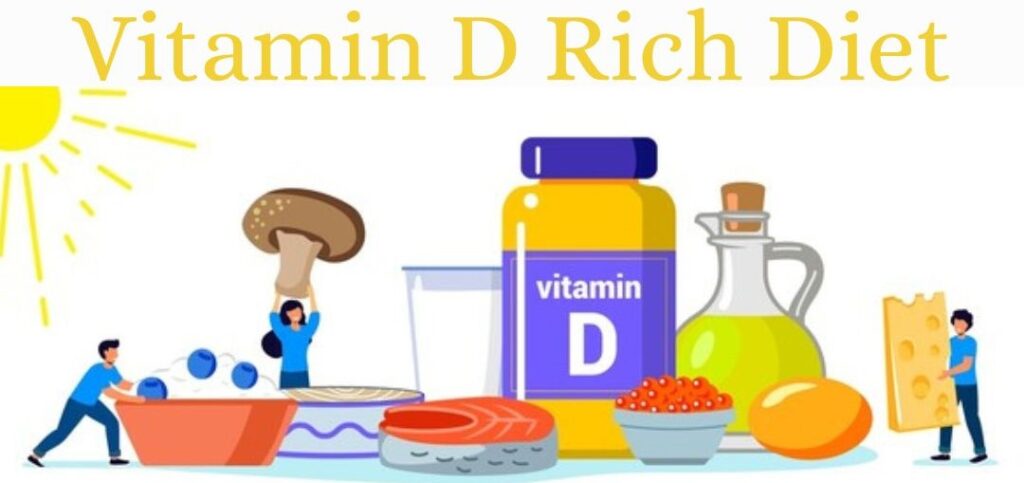- Vitamin D is Known as the “Sunshine vitamin,” because your body can produce Vitamin D when your skin is exposed to sunlight.
- Vitamin D is a fat-soluble vitamin, essential for strong bones, hair, Immune System, Brain Health, and skeletal health.
Functions and Benefits
- Important for Healthy Bones and Teeth.
- Vit. D supports Hair growth.
- Maintain Mental health like depression, Stress and Anxiety.
- Preventions from hypertension (high blood pressure), heart disease, and stroke.
- Vit. D reduce the risk of conditions like osteoporosis, rickets (in children) and osteomalacia (in adults).
- Reduces the risk of certain types of cancer, including colorectal, breast, and prostate cancer.
- Reduce the risk of insulin resistance and type 2 diabetes.
- Help manage certain hair loss conditions.
- Vit. D may be involved in fertility and reproductive hormone regulation.
Daily Requirement of Vitamin D
| Age Group | RDA (IU/day) |
|---|---|
| 0-12 months | 400 |
| 1-18 years | 600 |
| 19-70 years | 600-800 |
| 71 years and older | 800-1,000 |
| Pregnant/Breastfeeding | 600-800 |
Sources – Vitamin D Rich Foods
While the primary source of vitamin D is sunlight exposure, there are also several foods that contain significant amounts of this vit. D.
- From Sun
- Spending around 10-30 minutes in the Morning sunlight, with an unprotected face, arms, and legs, a few times a week.
- But don’t forget to protect your skin with sunscreen. Excessive sun exposure can damage your skin.
- Fatty Fish – Sources: Salmon, mackerel, and trout are some of the best sources of vitamin D.
- Nutritional Value: 100-gram cooked salmon can provide up to 570 IU (International Units) of vitamin D.
- Mackerel – 100-gram serving can provide approx. 360-500 IU of vit. D.
- Trout – 236 IU of vitamin D in a 100-gram serving of canned tuna.
- Mushrooms – such as shiitake and portobello, are exposed to ultraviolet (UV) light to boost their vit. D content.
- Nutritional Value: Just a few UV-exposed mushrooms can provide between 400-800 IU of vitamin D per 100 grams serving.
4. Eggs Nutritional Value – A single large egg yolk contains about 44 IU of vit. D, making it a versatile and accessible source.
5. Fortified Foods Sources – Such as dairy products, plant-based milk, and breakfast cereals, are fortified with vit. D.
- Nutritional Value – Fortified products can contain anywhere from 100 to 600 IU of vit. D per serving, depending on the brand and type.
6.Cod Liver Nutritional Value – A single tablespoon of cod liver oil can provide 1,360 IU of vitamin D. It’s a powerful option for those looking to boost their intake.
Vitamin B7 (Biotin) Rich foods Sources...Read
Deficiency Disorder
When your body doesn’t receive enough Vitamin D, it can lead to various health issues. Some of the common disorders associated with Vit. D deficiency include:
-
- Rickets: This disorder primarily affects children. It leads to softening and weakening of the bones, causing skeletal deformities. Rickets can result in bowed legs, delayed growth, and dental problems.
- Osteomalacia: This condition affects adults and is characterized by the softening of bones due to inadequate mineralization. It can cause bone pain, muscle weakness, and an increased risk of fractures.
- Osteoporosis: multiple factors contribute to osteoporosis; vit. D deficiency can play a role. which affects bone density and increases the risk of fractures, particularly in older individuals.
- Muscle weakness: Inadequate vit. D levels can contribute to muscle weakness and fatigue. This weakness may affect both skeletal muscles and the muscles involved in respiratory function.
Management of Vitamin D deficiency
Consult with your healthcare provider for proper diagnosis and management. Here are some strategies to manage and treat vitamin D deficiency effectively:
- Increase sunlight exposure: Aim for about 10–30 minutes of sunlight exposure on your face, arms, and legs a few times a week.
- Consume vit. D-rich foods: Include foods like fatty fish (salmon, mackerel), fortified dairy products, egg yolks, and fortified cereals in your diet.
- Take vit. D supplements: Your healthcare provider may recommend vit. D supplements to meet your daily requirements.
- Maintain a healthy weight: Obesity can affect vitamin D absorption, so maintaining a healthy weight is essential.
- Treat underlying medical conditions: Address any underlying medical conditions that may contribute to vit. D deficiency, such as kidney or liver diseases.

